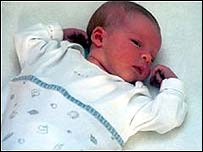French researchers examined 181 mothers, and found 9% had
severe depression - three-quarters of these had delivered a male
child.
The Journal of Clinical Nursing study suggested earlier poor
relationships with men could be a factor for some.
However, a specialist in the UK said the finding, although
interesting, could be a "statistical quirk".
![]() |
" The overwhelming finding of the study was
the fact that gender appears to play a
significant role in reduced quality of life as
well as an increased chance of severe postnatal
depression "
Professor Claude de Tychey
University of Nancy
|
Postnatal depression is common among new mothers - the latest
study at the University of Nancy found a third of those taking
part were affected to some degree.
In some societies, having a female baby has been linked to
the condition - due to the cultural preference for a male child.
However, the idea that having a male baby could exacerbate
the problem is an unexpected one.
The women involved were questioned on several different areas
of their health, including physical fitness, pain and mental and
emotional health.
The researchers, led by Professor Claude de Tychey, found
that seven out of ten women who had given birth to a boy
reported a lower quality of life compared with the average of
women who had given birth to a girl, regardless of whether they
had postnatal depression.
Although mothers of girl babies were more likely to have mild
postnatal depression, among the 17 women diagnosed with severe
postnatal depression, 13 had had male babies.
Emotional difference
The researchers did not have any evidence of a reason behind
this difference, and called for further research to discover it.
However, although they suggested there might be subtle
psychological differences in the attitudes of new mothers
towards boy and girl babies which might affect their emotional
state - particularly if they were already prone to depression.
They suggested a negative attitude to a son might be a legacy
of unsatisfactory relationships with important male figures in
their life, such as their father, or partner.
Professor de Tychey said: "The overwhelming finding of the
study was the fact that gender appears to play a significant
role in reduced quality of life as well as an increased chance
of severe postnatal depression.
"Women had the same scores regardless of whether the recent
birth was their first or second baby."
However, Dr Cosmo Hallstrom, a member of the Royal College of
Psychiatrists, said the numbers of women with severe depression
were too low to draw firm conclusions.
He said severe depression results were compromised by the
finding that a majority of the mothers with mild depression were
more likely to have given birth to girls.
He said: "It's an interesting talking point, but I'm not
entirely convinced by this, and would like to see it replicated
in larger trials.
"It's probably a statistical quirk."

